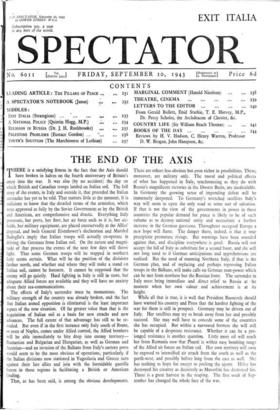THE END OF THE AXIS .
THERE is a satisfying fitness in the fact that the Axis should have broken in halves on the fourth anniversary of Britain's entry into the war. It was also (by no accident) the day on which British and Canadian troops landed on Italian soil. The full story of the events; in Italy and outside it, that preceded the Italian surrender has yet to be told. That matters little at the moment. It is sufficient to know that the detailed terms of the armistice, which were approved as fully by the Soviet Government as by the British and American, are comprehensive and drastic. Everything Italy possesses, her ports, her fleet, her air force such as it is, her air- fields, her military equipment, are placed unreservedly at the Allies' disposal, and both General Eisenhower's declaration and Marshal Badoglio's imply that Italian troops will actually co-operate in driving the Germans from Italian soil. On the nature and magni- tude of that process the events of the next few days will throw light. That some German troops will be trapped in southern Italy seems certain. What will be the position of the divisions farther north, and whether and where they will make a stand cn Italian soil, cannot be foreseen. It cannot be supposed that the enemy will go quietly. Hard fighting in Italy is still in store, but adequate Allied forces are available and they will have no anxiety about their sea-communications.
The effects of Italy's surrender must be momentous. The military strength of the country was already broken, and the fact that Italian armed opposition is eliminated is the least important aspect of the new situation. Of far greater value than that is the acquisition of Italian soil as a basis for new attacks and new advances. The full extent of that advantage has still to be re- vealed. But even if in the first instance only Italy south of Rome, or even of Naples, comes under Allied control, the Allied bombers will be able immediately to bite deep into enemy territory— Rumanian and Bulgarian and Hungarian, as well as German and Austrian—and an invasion of the Balkans from Italy's eastern ports would seem to be the most obvious of operations, particularly if the Italian divisions now stationed in Yugoslavia and Greece turn against their late allies and join with the formidable guerilla forces in those regions in facilitating a British or American landing.
That, as has been said, is among the obvious developments. There are others less obvious but even richer in possibilities. These, moreover, are military only. The moral and political effects of what has happened in Italy, synchronising as they do with Russia's magnificent victories in the Donetz Basin;are incalculable. In Germany the growing sense of impending defeat will be immensely deepened. To Germany's wretched satellites Italy's way will seem to open the only road to some sort of salvation. If that is not the view of the governments in power in those countries the popular demand for peace is likely to be of such volume as to destroy national unity and necessitate a further increase in the German garrisons. Throughout occupied Europe a new hope will flame. The danger there, indeed, is that it may precipitate premature risings. But warnings have been sounded against that, and discipline everywhere is good. Russia will not accept the fall of Italy as substitute for a second front, and she will not long need to if German anticipations and apprehensions are realised. But the need of manning Northern Italy, if that is the German plan, and of replacing and perhaps repressing Italian troops in the Balkans, will make calls on German man-power which can be met from nowhere but the Russian front. The surrender in Italy must bring immediate and direct relief to Russia at the moment when her own valour and achievement is at its height.
While all that is true, it is well that President Roosevelt should have warned his country and Press that the hardest fighting of the war for them is still in prospect. Germany may be driven out of Italy. Her satellites may try to break away from her and possibly succeed. She may well have to concede some of the countries she has occupied. But within a narrowed fortress she will still be capable of a desperate resistance. Whether it can be a pro- longed resistance is another question. Little more oil will reach her from Rumania now that Ploesti is within easy bombing range of the Allied air forces on Italian soil. Her own territory will soon be exposed to intensified air attack from the south as well as the north-west, and possibly before long from the east as well. She has nothing to hope for except to prolong the agony. Hitler has destroyed his country as decisively as Mussolini has destroyed his. There is a great harvest in the reaping. The first week of Sep- tember has changed the whole face of the war.


























